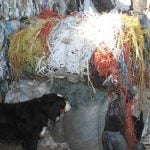ALARM bells sounded across Canada when the U.S. government included a “buy American” clause in its multibillion-dollar financial bail-out package.
Don’t they know that we are their largest single trading partner and their best neighbour? How could they do that to us when we’re already in an economic down-turn?
President Barack Obama seems to have heard the complaints. Everyone is being assured that the buy American policy will comply with all trade agreements that the United States has entered. That includes the North American Free Trade Agreement, which governs the flow of goods and capital between our countries.
Read Also

Worrisome drop in grain prices
Prices had been softening for most of the previous month, but heading into the Labour Day long weekend, the price drops were startling.
The promise of NAFTA and the 1989 Canada U.S. Free Trade Agreement before Mexico joined was that almost all trade barriers would be removed. NAFTA would assure Canadian goods unfettered access to that huge U.S. market. It would rip out fences – the fences that separated our economies.
Well, it hasn’t quite worked that way for Canada. Remember the long-running softwood lumber dispute. Effective make-shift fences can be thrown up when powerful interests are at stake and negotiating a way around them is costly.
But NAFTA has certainly increased trade between our countries, especially in energy and agriculture. Agricultural exports to the U.S. have tripled under it. Net farm incomes have decreased during this same period, but that’s another story.
Until 2003, the beef industry was the poster boy for the NAFTA advantage. Trade fences were ripped out. Cattle and capital poured over the borders. U.S. corporations bought up nearly all of the Canadian beef packing industry and consolidated the continental beef market. Market access, efficiency and expansion were the watchwords.
But a single case of BSE in a Canadian cow changed all that. High fences on the U.S. side went up and gates slammed shut.
Some years and billions of dollars later, most of the gates have been pried open again. It’s not clear yet whether the large country-of-origin labelling signs that are about to appear on those gates will turn back many Canadian cattle.
Good fences make good neighbours.
On the other hand, bad fences or no fences can endanger an entire neighbourhood or industry.
Our experience with NAFTA demonstrates that allowing large U.S. corporations to take over the beef packing industry has made it unsafe or financially unviable for smaller players.
This problem is recognized but not solved with the $50 million allocation for beef packers in the recent federal budget. Under NAFTA rules, any significant government investment in a competing Canadian plant could be challenged by the packers.
Reaching fair and viable trade arrangements with the United States is vital for both of our economies. NAFTA is unbalanced and unreliable. It gives corporations too much power, it leaves the U.S. government with too much leeway and it fails to protect Canadian business, industry and sovereignty.
Canada should start rebuilding sturdy fences with wide gates and fair gate keeping rules, for the sake of farmers, ranchers, rural neighbourhoods and all Canadians.
Nettie Wiebe is a farmer in the Delisle, Sask., region and a professor of Church and Society at St. Andrews College in Saskatoon.














